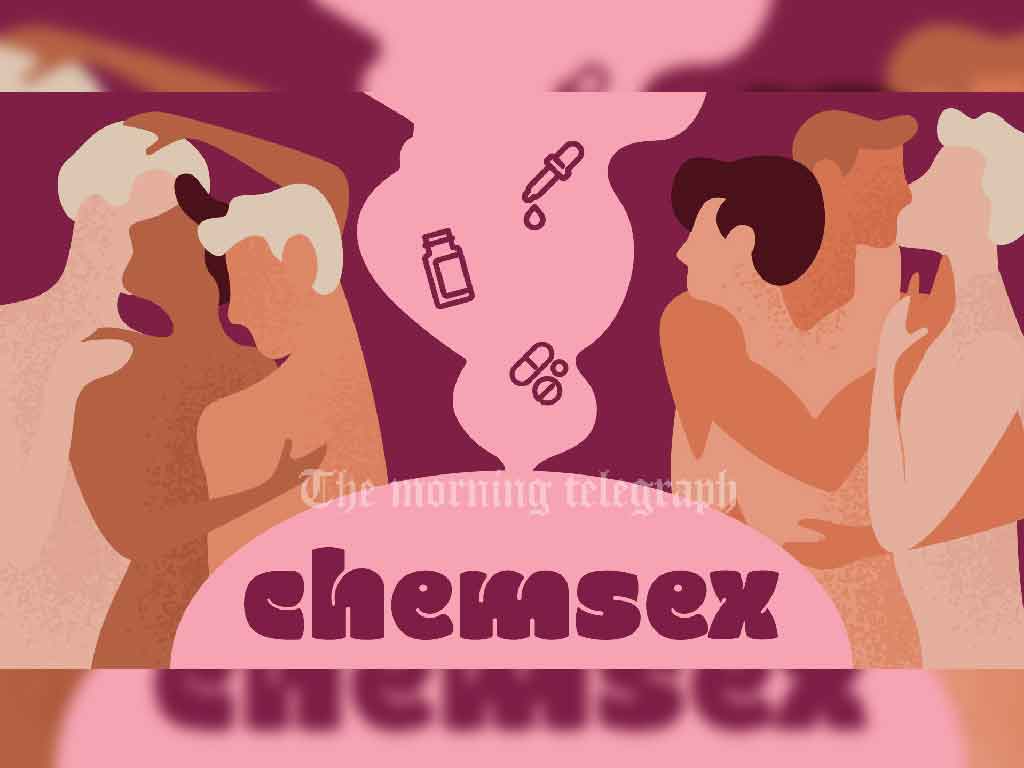
Chemsex: ‘I Got Used to It After Coming to His Rescue’
“I first got used to it because of my ex-boyfriend. He got me used to it,” 27-year-old Naomi told BBC Sinhala about her experience. Naomi revealed that she had been using methamphetamine, commonly known as ‘ice,’ for about a year. She further shared that she and her ex-boyfriend had become addicted to the drug during sex. BBC Sinhala has used pseudonyms to protect her identity and those who spoke about their experiences for this article.
What Is Chemsex?
Speaking to BBC Sinhala, Dr. Vino Dharmakulasinghe, a specialist in sexually transmitted diseases, explained that the use of drugs or medications before sexual intercourse to achieve greater sexual pleasure is called ‘Chemsex.’ “If we take some chemical substance before having sex, we call it Chemsex. Many people use this to increase sexual pleasure. We do not specify what substances are used,” he said.
“In such cases, it can be drugs that have medical approval or drugs or chemicals that are not approved. Many people use these at parties. In such places, people often resort to unprotected sex. In these situations, the chances of contracting sexually transmitted diseases are high,” he added.
“Awareness is being provided to selected groups about this. Currently, a data collection program on this in Sri Lanka is starting this year,” the specialist said.
A report released by the University of Cambridge on June 25, 2024, revealed that people in European countries are tempted to use ‘Chemsex’ or drugs for sexual intercourse to make the sexual act last longer and make the process easier. The research showed that there is a high tendency to use Chemsex or drugs for sexual intercourse among various communities, especially the homosexual community.
According to a report released by UNAIDS, the Joint United Nations Programme on HIV/AIDS, on November 13, 2024, it was revealed that by 2023, about 43% of new HIV infections in the Asia-Pacific region were among men who have sex with men. At the same time, the use of Chemsex in this community ranges from 3% to 31%, depending on the country. However, the report states that although Chemsex use is considered higher in the homosexual community, it is also used by others.
relevant article is bellow
————————————————————————————————–
New Asia Pacific healthcare provider toolkit serves people having chemsex
13 November 2024
Life became chaotic for Poon early. (Not his real name.)
As a gay teenager he was bullied at school by students and teachers. He moved in with his grandparents when his parents separated, but eventually left northern Thailand for Bangkok. There he survived through sex work.
Then Poon learned he was living with HIV. The weight of HIV prejudice merged with the stigma he already carried as a young gay man and sex worker. Some friends he made at a camp disclosed his HIV status online after an argument. He was diagnosed with major depressive disorder.
A partner introduced him to drug-use during sex. He went on to use multiple substances including methamphetamines and cocaine.
“Sex, drugs and alcohol are my escape,” he said.
This was one of the stories shared at the 6th Asia Pacific Chemsex Symposium (APCS). Held in Bangkok on November 6 and 7, the event brought together over 300 stakeholders from 27 countries. They shared their research and responses to a practice that remains largely hidden and not yet well understood. The event specifically explored pleasure as opposed to risk as an entry point for providing services.
Chemsex—also called High Fun in several Asian countries—refers to the use of stimulant drugs during sexual activity. It lowers inhibitions and may increase risk-taking. There are several public health implications including higher rates of HIV and sexually transmitted infections (STIs), lower adherence to treatment, overdose and the fallout linked with intoxication.
In Asia Pacific four of every five new HIV infections are among people from key population communities including men who have sex with men or MSM, people who use drugs, people in prisons or other closed settings, sex workers and transgender people. Young people make up a quarter of all new HIV infections and in some countries around half of new infections are among youth ages 15 to 24.
Several countries in the region are facing an HIV prevention crisis with new infections among MSM either increasing or decreasing far too slowly. In 2023, 43% of new infections in Asia-Pacific were among MSM. At the same time, there is evidence that the practice of chemsex in this community ranges from 3% to 31% depending on the country. But although chemsex is most visible in the MSM community, it is practiced by people from all populations.
“We are talking about sex and drugs—two topics that people call taboo,” said Brigitte Quenum, UNAIDS Regional Team Lead for Sciences, Systems and Services at the opening ceremony. “But as HIV has taught us, to reach people, we must confront the realities of their lives.”
Toolkit now avaailable for Asia Pacific health workers
On day 2 of the symposium UNAIDS and UNODC launched the first-ever toolkit on chemsex for Asia Pacific clinical service providers. The toolkit was developed by the Australian Society for HIV, Viral Hepatitis and Sexual Health Medicine (ASHM). It is geared toward health workers in Asia and the Pacific working with men who have sex with men and transgender women.
“The increasing use of stimulant drugs in the region, including for ‘Chemsex’, poses significant health risks, including drug use disorders and various psychosocial challenges,” said Masood Karimipour, Regional Representative of UNODC’s Office for Southeast Asia and the Pacific. “This UNAIDS-UNODC toolkit provides essential guidance for healthcare providers to address these challenges through evidence-based interventions. It emphasizes the importance of holistic, non-judgmental care that prioritizes the physical, psychological and social wellbeing of individuals, while ensuring access to harm reduction services and the prevention and treatment of drug use disorders within a comprehensive continuum of care.”
The resource was created to support comprehensive clinical services in the region’s restrictive legal environments. Twenty-eight countries in Asia Pacific criminalise drug possession for personal use while 17 criminalise same-sex relations. Penalties for drug-related offences in the region are among the world’s harshest.
The toolkit was developed through consultation with clinicians, community representatives and government agencies. It covers chemsex basics as well as approaches to harm reduction, sexual health, and mental health services. It also covers different service delivery models including face-to-face, online and by communities. The toolkit offers guides and tools on topics such as initiating non-judgmental conversations and risk assessment.
“Stronger HIV prevention strategies tailored to chemsex are needed, along with expanded, inclusive services for sexual, physical and mental health,” said Suniya Taimour, UNAIDS’ Community-led Responses Advisor for Pakistan and Afghanistan.
Thia approach recognises that comprehensive health services can be lifesavers by using one point of contact to address multiple issues including physical, sexual and mental health as well as social issues. Poon is a living example. He has benefitted from a service package that has combined his HIV treatment with harm reduction interventions and psychiatric care. Today he is a 22-year-old university student with clear life goals who feels more empowered about his HIV status.
End of the Article
‘I Resorted to It to Save Him’
Naomi and others in Sri Lanka have been using various drugs, including ice, to engage in sexual activity for longer periods, BBC Sinhala Service revealed. Naomi explained her experience to BBC Sinhala Service, detailing how her ex-boyfriend influenced her.
“My ex-boyfriend was from Sri Lanka. He had been using ice drugs while he was in the country. At that time, he was in a relationship with another girl. Later, he came to Sri Lanka and stopped using ice drugs. At that time, we were friends,” she said.
‘It Feels Different When You Have Sex with It’
Naomi said that after taking ice, she felt a sensation she had never experienced before during sexual intercourse. She did not feel any fatigue and continued to use it afterward.
“When my boyfriend and I met, we used to use it. At first, he would come home looking for this drug. When we both used ice and had sex, there was a difference in the feeling we got from it. I could have sex no matter how long it took, and I could have sex more often. I felt a lot of excitement when I had sex with it,” she said.
“We had been using ice for almost a year and having sex. When we finally got together, this drug had become indispensable to us. After a while, when my boyfriend couldn’t find the drug, I had contacts to find it. Finally, I came to his rescue and reached the point where I brought it to him myself,” she added.
“After a while, I realized that he was looking for me because he was using the drug. By then, he had reached a point where he couldn’t find it,” she said.
‘I Realized the Seriousness of It Myself’
Naomi revealed that over time, her boyfriend’s behavior completely changed, and he, like her, had become mentally and physically weak.
“After a while, I realized that my boyfriend and I were getting weaker and weaker because of taking drugs. After using it, we couldn’t eat anything for a day. Only things we drank would come to mind. With that, we both got thinner and thinner. Even our friends started asking us what was wrong. After about a year of using the drug, my boyfriend found it difficult to have sex. He eventually started taking aphrodisiacs, but he couldn’t have sex properly,” she said.
“I realized the seriousness of it when my boyfriend’s friends told me that he wouldn’t even come out of his room for about a week when he went home. That’s when I started looking into this. Sometimes I would just hear a radio or music playing while I was there,” she added.
“At that time, my boyfriend even started bleeding from his nose. I asked him to go to a doctor several times, but he didn’t want to at the last minute. He became very stubborn and started fighting and being suspicious of me. Finally, he decided to leave the country all of a sudden without even telling me. I have been receiving counseling and am slowly getting back to normal,” Naomi shared.
‘The Risk of Contracting Sexually Transmitted Diseases Is High’
“People who use drugs engage in unprotected sex. This often increases their risk of contracting sexually transmitted diseases such as HIV and Hepatitis B,” Dr. Nimali Jayasuriya, a specialist in sexually transmitted diseases, told BBC Sinhala.
“There is information that this system is now available in Sri Lanka. But we do not have the data on it. Unlike people who are addicted to heroin, even well-educated people between the ages of 20 and 40 are at higher risk of using drugs like ice,” the specialist said.
‘I Got Used to This with My Field’
A 26-year-old youth, Yomal, who spoke to BBC Sinhala Service, said that he was tempted to use certain types of drugs when he participated in music concerts on certain occasions.
“I often participate in music concerts with the industry I work in. To feel the music at those concerts, there are some party drugs. I also use them. When I use such drugs, usually after about half an hour, I start feeling the effects of that drug. At such times, even if it is 7-8 hours, I stop dancing and jumping. After that, I have had sex with my girlfriend. I can have sex most of the time,” he said.
“But after using these drugs, I still feel the effects for a few days. Sometimes my jaw even shakes. And I even look for friends who are close to me because of the effects of the drug. I can’t eat for a day or two,” he shared.
‘Now I’m Trying to Get Rid of It’
Meanwhile, another 36-year-old man, Pathum, who was interviewed by BBC Sinhala, said that he also turned to using various drugs due to his desire to have sex for a long time.
“It’s been 8 years since I got married. I have two babies now. First, a friend of mine told me that if I take this and have sex, I can have sex for a long time. I tried it with my friend one day. Then I went to a spa. That’s when I realized it was true. Then I usually started using ice once or twice a month and some drugs that are used at parties,” he said.
“But now I’m trying my best to stop it. Because I understand that now I’ve been feeling a difference for a long time. I can’t sleep after taking these. Even my wife asks me why I’m like this. She tries to take me to the doctors. But I won’t go. If I go, I know that it won’t take them long to realize that this is what happened because I use something like this. Now I’m trying my best to get rid of this,” Pathum said.
Does Drug Use Help to Engage in Sexual Activity for Longer?
Dr. Manoj Fernando, a senior lecturer at Rajarata University, who spoke to the BBC Sinhala Service, said that people are tempted to use drugs to prolong sexual activity simply because of ‘superstitions and stories that have been built up around it.’
The doctor further explained that it is common for mentally weak people to resort to drug use.
“A lot of people are tempted to take such drugs because of superstitions. There is no scientific basis for saying that sexual energy increases. But all drugs have those stories. Heroin, ice—there are some common myths associated with many drugs that have been used for a long time. Some stories have been linked to this, such as increasing sexual power and bringing happiness,” he said.
“Some people are tempted to take drugs due to mental stress. Especially the attraction created by drugs is one reason for this. Like what you see in movies, people who use drugs use various tricks to attract people to them. Also, there are cases where many people are tempted to take drugs due to the temptation of friends,” he added.
“Drugs do not have the ability to prolong sexual intercourse. The person who uses such drugs thinks that they are having sex for a longer period of time. In that case, they mentally think that they have been having sex for a longer period of time.”
“Some people feel sleepy and lifeless when they take drugs. People who use such drugs take a long time to become aroused during sexual intercourse. So they think that they have engaged in sexual intercourse with the time it takes to become aroused. But the truth is that ice or heroin or any other drug does not have the ability to prolong sexual intercourse for a longer period of time,” said Dr. Manoj Fernando.
[Please note that the names of the people who shared their experiences here have been changed to protect their identities.]
SOURCE :- BBC SINHALA




